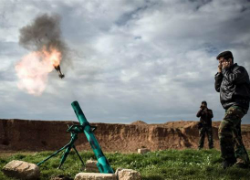
As the Syrian Civil War rages unabated, the conflict has taken on a distinctly sectarian angle. Bashar Al-Assad’s forces are now composed mainly from the President’s own Alawite sect, an offshoot of Shi’a Islam, which sees the fortunes of their minority community as intertwined with those of the regime. After 2 years of brutal urban warfare, the regime’s forces are stretched to the breaking point. However, the Alawite forces of President Assad may be receiving an increasing amount of support from their co-religionists of the Shiite Lebanese militia, Hezbollah.
There have been reports since the start of the war in Syria that Hezbollah has been backing the Syrian regime with men and material. Both Syria and Hezbollah are primary allies of Shi’ite Iran, and receive hundreds of millions of dollars a year in financial and military support from the Islamic Republic. Hezbollah’s support of the Assad regime has made it an enemy of the mainly Sunni Syrian rebel forces, as well as escalated tensions between Sunnis and Syrian regime supporters in neighboring Lebanon.
This tension escalated dramatically this week as Hezbollah forces within Lebanon exchanged sustained fire with the Free Syrian Army (FSA) rebels within Syria. Hezbollah claims it intervened to protect Shi’ite villages in Syria along the Lebanese border from attacks by the Sunni FSA. The FSA accuses Hezbollah of assisting the Assad regime and threatened to take the fight to Hezbollah in Lebanon if the group did not cease its advance into Syrian territory. The FSA subsequently claimed to have attacked Hezbollah positions in Lebanon, killing and wounding a number of Hezbollah fighters.
Clashes between Hezbollah and Syrian rebels threatens to internationalize Syria’s already bloody civil war. Like its larger neighbor Syria, Lebanon contains an explosive mix of Sunni, Shi’ite, Druze and Christians. The country has yet to fully recover from the devastating 1975-1990 civil war, which pitted the countries religious groups against one another. Spillover violence from Syria threatens the fragile stability of Lebanon, and could draw in other regional actors, such as Israel, who fought a 34-day war with Hezbollah in 2006, which ended in a stalemate.
Urgent international action is needed if the terrible consequences of the Syrian civil war morphing into a regional war are to be avoided. Rather than attempt to calm the fighting, the international community may have recently decided to increase the flow of weapons, including anti-tank and other heavy weapons, to FSA brigades fighting in the south of the country. The conflict in Syria has killed an estimated 70,000 people in that country, and the probability the death toll will soon include growing numbers of Lebanese increases every day.
Phillip Khalife is a 3L at Sturm College of Law and a Staff Editor for the Denver Journal of International Law and Policy

